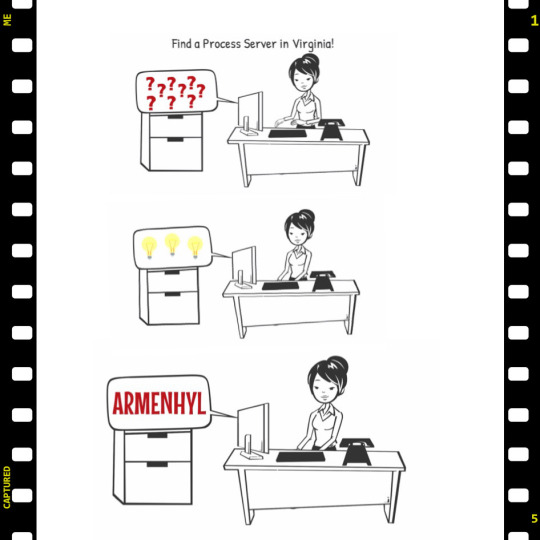#shenandoah valley juvenile detention center
Text
https://youtu.be/IR2E9k_w07M
youtube
ARMENHYL Virginia Process Servers are available throughout the Commonwealth of Virginia!
Process Service - Staunton VA 24401 - Fishersville VA 22939 - Waynesboro VA 22980 - Stuarts Draft VA 24477 - Craigsville VA 24430 - Verona VA 24482 - Weyers Cave VA 24486 - Lexington VA 24450 - Covington VA 24426 - Monterey VA 24465 - Harrisonburg VA 22801 - Charlottesville VA 22901 - Front Royal VA 22630 - Winchester VA 22601 - Culpeper VA 22701 - Elkton VA 22827 - Berryville VA 22611 - Leesburg VA 20175 - Bridgewater VA 22812 - Dayton VA 22821 - Hinton VA 22831 - Broadway VA 22815 - Timberville VA 22853 - McGaheysville VA 22840 - Orange VA 22960 - Madison VA 22727 - Warrenton VA 20186 - Crozet VA 22932 - Lake Monticello VA 22963 - Lovingston VA 22949 - Luray VA 22835 - McClean VA 22101 - Arlington VA 20330 - Reston VA 20190 - Ashburn VA 20103 - Fairfax VA 22030 - Alexandria VA 22206 - Manassas VA 20108 & Surrounding Areas throughout the Commonwealth of Virginia!
Contact ARMENHYL today at [email protected] - (434) 260-1031 - (540) 416-1660!
Visit ARMENHYL at www.armenhyl.com and on social media!
We look forward to our next opportunity to serve you!






#craigsville va#middle river regional jail#verona va#western state hospital#22939#22980#24401#armenhyl#augusta health#hershey chocolate of virginia#shenandoah valley juvenile detention center#shenandoah national park#shenandoah valley#shenandoah valley regional airport#augusta correctional center#augusta county va#west augusta va#commonwealth of virginia#virginia process service#virginia process servers#virginia state police#virginia#mary baldwin university#blue ridge community college#woodrow wilson#virginia school for the deaf and blind#distribution center#churchville va#swoope va#stuarts draft va
0 notes
Text
Stop expelling and separating immigrant children and parents during COVID
The separation of children and families at the border was deemed unconstitutional with an executive order to stop back in June 2018. So why are children still at risk of the government separating them from their parents?
BY DR. SUZAN SONG, OPINION CONTRIBUTOR — 05/25/20 07:00 PM EDT 916
THE VIEWS EXPRESSED BY CONTRIBUTORS ARE THEIR OWN AND NOT THE VIEW OF THE HILL
Earlier this month, two Salvadoran sisters, 8 and 11 years old, came to the U.S. border seeking protection but were sent to Mexico under the Migrant Protection Protocols (MPP) program. They came back to the U.S. border again and were approved for reunification with their mother in Houston. But Immigration and Customs Enforcement (ICE) is currently moving to deport them back to a country where their lives are endangered, and where they have no adult to care for them.
This is despite a federal judge’s ruling last month that the administration has violated the Flores settlement that mandates “safe and sanitary” conditions and to make “prompt and continuous efforts” to release children and reunify families in the U.S. while their immigration cases proceed. The government has turned their attention away from the protection of children at our border over the past few weeks due to the COVID-19 pandemic.
Children have traumatic options when they come to our border. They can (1) be quickly expelled to countries with high rates of child trafficking and violence, where they may or may not have an adult to care for them; (2) kept in a U.S. sponsored shelter but then awoken at all hours and flown out of the country without the family being aware; (3) can be separated (even if infants or toddlers) if their parents relinquish custody; or (4) can remain indefinitely detained with their families during the pandemic, despite a ruling that found insufficient measures to protect children and families in detention from COVID-19.
All of these “options” are abusive to children. As a child/adolescent psychiatrist and humanitarian protection adviser, I’ve worked for over a decade with unaccompanied children and their families. The government is creating an allostatic load of stress that can accumulate and cause irreparable physical and mental health damage to children.
Alejandro, a 17-year-old boy in the Shenandoah Valley Juvenile Center told me in an interview prior to the pandemic, “I had to leave El Salvador after a gang kidnapped me. I escaped but they’re after me. I know my father is dead, and don’t know if my brother is alive.
Today I’ve had 14 days of good behavior, so hopefully I’ll move down a level to a different shelter. I saw aunts, family, and friends taking others away from the shelters, but I’m the only one left.”
These children crossing the border know uncertainty (if they will live through violence), waiting (for sponsorship or the next shelter), and isolation (from support and culture).
On top of this, children crossing the border are also facing ambiguous loss, unsure if family and friends are alive or safe, cultural bereavement, and the traumatic loss of loved ones.
Studies are overwhelmingly clear on the toxic physical and mental health effects of family separation and detention on child development and health. Forcing detention or separation from parents during a global pandemic only furthers the abuse these children have endured.
The COVID pandemic presents a public health safety risk, and the President has the power to block foreigners from entering the country to prevent a “serious threat” of worsening the pandemic. But officials are deporting children who were in the U.S. prior to the pandemic. This week, the Trump administration extended indefinitely the policy that allows children to be immediately expelled at the border, though it violates the Trafficking Victims Protection Act and the 1980 Refugee Act.
Expelling children to violent situations, detaining children with parents in filthy conditions without the capacity for hygiene, or separating children from parents, are not suitable solutions during the COVID-19 crisis. We need to promptly release and reunify children with their families and end family detention. Our society should not be one in which some children and families are more deserving of basic human rights than others.
Suzan Song, M.D., MPH, Ph.D. is a Harvard- and Stanford trained physician, currently Division Director of Child, Adolescent & Family Psychiatry at George Washington University and a humanitarian protection adviser. She has clinically served unaccompanied children, asylum seekers, and survivors of torture for over a decade.
Article Source
1 note
·
View note
Text
Babies as young as 3 months old arrive in Michigan after being taken from their immigrant parents
This Doctor Treated Kids Separated From Their Parents And What She Saw Is Heart-Wrenching. "Their trauma, and the direct effect it was having on their development, was obvious."
The Heartbreaking Reality Of Migrant Parents Searching For Their Children
Ask an Immigration Lawyer: Migrant Parents Face a Long, Complicated Road Ahead to [Try To] Get Their Children Back. [Trump’s new order does not include the children who were already kidnapped.]
Judge explodes over missing children: ‘They take your kids and you get nothing? Not even a slip of paper?’
Migrant Children Drugged Without Consent At Government Centers, Court Documents Show. “ORR routinely administers children psychotropic drugs without lawful authorization,” a memo filed in the lawsuit on April 16 reads. “When youth object to taking such medications, ORR compels them. ORR neither requires nor asks for a parent’s consent before medicating a child, nor does it seek lawful authority to consent in parents’ stead. Instead, ORR or facility staff sign ‘consent’ forms anointing themselves with ‘authority’ to administer psychotropic drugs to confined children.”
About 500 Children Separated at the Border Have Been Reunited With Families, Official Says. [IF they are telling the truth that still leaves over 1500 still separated.]
Immigrant children as young as 14 housed at a juvenile detention center in Virginia say they were beaten while handcuffed and locked up for long periods in solitary confinement, left nude and shivering in concrete cells. The abuse claims against the Shenandoah Valley Juvenile Center near Staunton, Virginia, are detailed in federal court filings that include a half-dozen sworn statements from Latino teens jailed there for months or years.
The Navy memo outlines plans to build “temporary and austere” tent cities to house 25,000 migrants at abandoned airfields just outside the Florida panhandle near Mobile, Alabama, at Navy Outlying Field Wolf in Orange Beach, Alabama, and nearby Navy Outlying Field Silverhill.
'They Are Prisons': Inside Trump's Executive Order on Indefinite Family Detention
There Are Effective Alternatives to Family Detention. The Trump Administration Already Ended One
“In classic Trumpian fashion, the President took credit for reversing a policy he had previously said he couldn’t reverse,” the editors write. “But this was a problem of his own creation, and ‘zero tolerance’ is part of it.”
Trump complained about due process for immigrants accused of breaking U.S. laws in an early morning tweet.
“Stephen [Miller] actually enjoys seeing those pictures at the border,” an outside White House adviser said. “He’s a twisted guy, the way he was raised and picked on. There’s always been a way he’s gone about this. He’s Waffen-SS.” [Tons of people are picked on. They don’t become nazis.]
GOP Congressman Defends Cages For Migrant Kids: Playgrounds Have Chain-Link Fences
Dem lawmaker plays audio of crying immigrant kids — as Republican tries to shut him down
It Turns out All Kinds of Tech Companies Are Working With ICE
------------
tidalrace said: Miller isn’t the one who said “womp womp” so I’m not sure about that one.
Ack! I fixed it. That was lewandowski. There are so many evil people in this admin it’s hard for me to keep track sometimes. Thanks for pointing it out! :)
12 notes
·
View notes
Text
New story in Politics from Time: Harsh Treatment of Immigrant Children at Virginia Detention Center Was Not Abuse, Investigators Say
(WASHINGTON) — A state review into the treatment of immigrant teens held at a Virginia detention center confirmed the facility uses restraint techniques that can include strapping children to chairs and placing mesh bags over their heads.
But investigators concluded the harsh treatment described by detainees at the Shenandoah Valley Juvenile Center did not meet the state’s legal threshold of abuse or neglect, according to a copy of the findings issued Monday by the Virginia Department of Juvenile Justice and obtained by The Associated Press.
The regulators did make several recommendations to improve conditions inside the facility, including hiring more bilingual staff and better screening to provide care for detainees who suffer from mental health issues.
Virginia Gov. Ralph Northam ordered the review in June hours after the AP published first-person accounts by children as young as 14 who said they were handcuffed, shackled and beaten at the facility, located near Staunton, Virginia. They also described being stripped of their clothes and locked in solitary confinement, sometimes strapped to chairs with bags over their heads.
The state investigators said they were unable to interview the immigrant teens who made sworn statements saying they were severely abused. Those who made the initial complaints as part of a federal class-action lawsuit filed in November 2017 were subsequently transferred to other facilities or deported back to their home countries after the resolution of their immigration cases.
The Virginia governor issued a statement applauding his administration’s “quick and comprehensive examination.”
“I take these allegations very seriously and directed members of my administration to immediately look into these claims of abuse and mistreatment,” said Northam, a Democrat. “The safety of every child being held there is of the utmost importance.”
Hannah M. Lieberman, a lawyer at the at the Washington Committee for Civil Rights and Urban Affairs representing the Latino teens, said the state report doesn’t disprove the abuse allegations made by her clients. She said the legal case against the facility will proceed.
The incidents described in sworn statements from six Latino teens are alleged to have occurred between 2015 and 2018, under both the Obama and Trump administrations.
Though incarcerated in a facility similar to a prison, the children detained on administrative immigration charges have not been convicted of any crime. The U.S. Office of Refugee Resettlement oversees the care of immigrant children held in federal custody.
Following AP’s report in June, state investigators interviewed 22 federal detainees currently held at the Shenandoah facility. Of those, three said they had experienced abusive behavior by staff. According to the state report, local child protective services investigators reviewed those complaints and determined they “did not meet the legal definition of abuse or neglect.”
The state investigators were only allowed to interview the federal detainees while a member of the facility’s staff was in the room. They also reviewed case files, medical records and other documents kept inside the facility, but were barred from making any copies or keeping any handwritten notes.
While the investigators said they found no evidence of the beatings and other severe abuse described in the lawsuit, their report does confirm that staff at the Shenandoah facility are trained in the use of restraint chairs and “mesh spit guards” for “out-of-control residents who cannot be safely restrained by less intrusive methods.”
Such restraint devices are legal for use in juvenile detention facilities in Virginia, though regulations say they can never be used as punishment and are only appropriate “to ensure the safety and security of residents, staff and the facility.”
In two of the instances reviewed by investigators, the report says staff members at the facility were disciplined for using restraint techniques that did not follow state guidelines. However, those incidents, which were not detailed in the report, did not involve the use of restraint chairs.
While some teens cited in the lawsuit reported being left in the restraint chair overnight or isolated alone in their cells for days at a time, the investigators said the documents they reviewed showed no record of that. According to the facility’s records, there was only one documented example of a child kept locked in isolation for 23 consecutive hours.
The Shenandoah lockup is one of only three juvenile detention facilities in the United States with federal contracts to provide “secure placement” for immigrant children who had problems at less-restrictive housing.
On average, 92 immigrant children each year cycle through Shenandoah, most of them from Mexico and Central America. It received $4.2 million in federal funds last year to house children between the ages of 12 and 17 facing deportation proceedings or awaiting rulings on asylum claims.
By Michael Biesecker / AP on August 13, 2018 at 03:04PM
0 notes
Link
A Virginia board has voted to expand its oversight of immigrant youth housed in Virginia juvenile detention centers, according to a release.
Gov. Ralph Notham requested a review after an investigative report by the Associated Press in June about a lawsuit alleging youth immigrants were abused at the youth detention center in Verona.
The incidents, described in sworn statements from six Latino teens included in a class-action lawsuit filed in November, are alleged to have occurred from 2015 to 2018, the Associated Press said. The teens who made the initial complaints were subsequently transferred by federal authorities to other facilities or deported to their home countries, the Associated Press said.
A state investigation followed where investigators confirmed restraint techniques utilized at the Shenandoah Valley Juvenile Center did not meet the legal threshold of abuse or neglect, according to the Associated Press.
This week, the Board of Virginia Department of Juvenile Justice voted to expand its oversight of youth who are there through a contract with an outside entity, like immigrant youth in federal custody being housed the SVJC in Staunton, the release said.
"The team did find that the SVJC is a well-run facility that attempts to treat its staff and residents with respect and dignity," the report said. "While (Department of Juvenile Justice) staff did not find sufficient evidence to support the conditions described in the lawsuit, the DJJ staff nevertheless identified areas where SVJC could strengthen its programming for this uniquely challenging group of youth — young people who have been frequently exposed to high levels of trauma, who are separated from their families, and who confront numerous language and cultural barriers, among others, to succeeding in SVJC and upon their release."
0 notes
Text
WASHINGTON | State probe finds immigrant teens not currently being abused
New Post has been published on https://is.gd/mOv3jD
WASHINGTON | State probe finds immigrant teens not currently being abused
WASHINGTON — A state review into the treatment of immigrant teens held at a Virginia detention center confirmed the facility uses restraint techniques that can include strapping children to chairs and placing mesh bags over their heads.
Investigators concluded the current treatment of detainees at the Shenandoah Valley Juvenile Center did not meet the state’s legal threshold of abuse or neglect, according to a copy of the findings issued Monday by the Virginia Department of Juvenile Justice and obtained by The Associated Press.
But a top state regulator conceded in an interview that investigators did not attempt to determine whether serious allegations of past abuse at the locally run facility are true.
Democratic Gov. Ralph Northam ordered the review in June, hours after the AP published first-person accounts by children as young as 14 who said they were handcuffed, shackled and beaten at the facility. They also described being stripped of their clothes and locked in solitary confinement, sometimes strapped to chairs with bags over their heads.
The incidents are described in sworn statements from six Latino teens included in a class-action lawsuit filed in November and are alleged to have occurred from 2015 to 2018, under both the Obama and Trump administrations. The teens who made those initial complaints were subsequently transferred by federal authorities to other facilities or deported to their home countries.
Angela C. Valentine, the chief deputy director of the state juvenile justice agency, said Monday that investigators interviewed only the 22 who were being held at the facility in late June, following the AP’s report. She said the investigators were not permitted to review the case files or medical records of past detainees who say they were abused.
The legal advocacy group representing the Latino teens suing the facility called the state’s review “deeply flawed” and said the investigators never contacted them or asked to speak to their clients.
“The children in this facility are denied necessary mental health care and subjected to abusive conditions,” said Jonathan Smith, executive director of the Washington Lawyers’ Committee for Civil Rights and Urban Affairs. “We look forward to proving our case in court.”
Though incarcerated in a facility similar to a prison, the children detained on administrative immigration charges have not been convicted of any crime. The U.S. Office of Refugee Resettlement oversees the care of immigrant children held in federal custody.
The regulators did make several recommendations to improve current conditions inside the facility, including hiring more bilingual staff, expanding “culturally relevant programming” and improving screening to provide care for detainees who suffer from mental health issues. The state also said administrators should consider new furniture and fresh paint to make the jail-like facility “more developmentally appropriate.”
Northam issued a statement applauding his administration’s “quick and comprehensive examination.”
“I take these allegations very seriously and directed members of my administration to immediately look into these claims of abuse and mistreatment,” he said. “The safety of every child being held there is of the utmost importance.”
The Shenandoah lockup is one of only three juvenile detention facilities in the United States with federal contracts to provide “secure placement” for immigrant children who had problems at less-restrictive housing.
On average, 92 immigrant children annually cycle through the facility nestled in the mountains outside Staunton, most of them from Mexico and Central America. The locally managed commission that runs the center received $4.2 million in federal funds last year to house children ages 12 to 17 facing deportation proceedings or awaiting rulings on asylum claims.
Of the 22 federal detainees currently held at Shenandoah in June, three told investigators they had experienced abusive behavior by staff. According to the state report, local child protective services investigators reviewed those complaints and determined they “did not meet the legal definition of abuse or neglect.”
The state investigators were only allowed to interview the federal detainees while a member of the facility’s staff was in the room. They also reviewed case files, medical records and other documents related to the current detainees, but were barred from making copies or keeping handwritten notes.
Shenandoah deputy director Timothy Showalter issued a statement Monday that promoted the state’s findings as an exoneration.
“The report confirms our long-standing dedication to being a well-run facility that treats our residents with respect and dignity,” the facility’s statement said.
A spokeswoman for the Department of Health and Human Services, which includes the federal refugee resettlement responsible for housing detained immigrant children, said the agency treats any allegation of abuse “with the utmost seriousness.”
“The Office of Refugee Resettlement has strong policies in place to combat incidents of abuse at every shelter under its purview,” said Caitlin Oakley, the HHS spokeswoman. “Any assertion to the contrary is misguided and inaccurate.”
A separate class-action lawsuit filed on behalf of immigrant children housed at a nonprofit facility in Texas alleged the residents were routinely administered psychotropic drugs without their parents’ consent, keeping them in a sedated “chemical strait jacket.” Last month a federal judge found staff at the Shiloh Treatment Center outside Houston had violated federal law by drugging the children.
While the Virginia investigators said they found no evidence of the beatings and other severe abuse described in the 2017 lawsuit, their report does confirm that staff at the facility are trained in the use of restraint chairs and “mesh spit guards” for “out-of-control residents who cannot be safely restrained by less intrusive methods.”
Such restraint devices are legal in juvenile detention facilities in Virginia, though regulations say they can never be used as punishment and are only appropriate “to ensure the safety and security of residents, staff and the facility.”
In two of the instances reviewed by investigators, the report says staff members were disciplined for using restraint techniques that did not follow state guidelines. However, those incidents, which were not detailed in the report, did not involve restraint chairs.
While some teens cited in the lawsuit reported being left in the restraint chair overnight or isolated in their cells for days at a time, the investigators said the documents they reviewed showed no record of that. According to the facility’s records, there was only one documented example of a child kept locked in isolation for 23 consecutive hours.
As part of their findings, the state investigators recommended the facility’s staff receive additional instruction in techniques for de-escalating conflicts and retraining in how to safely strap down unruly teens.
By MICHAEL BIESECKER , Associated Press
#currently being abused#immigrant teens held#Shenandoah Valley Juvenile Center#state investigators recommended#State probe finds immigrant#TodayNews#Trump administration's#Virginia Department of Juvenile Justice#Washington
0 notes
Text
Migrant kids were stripped, drugged, locked away. So much for compassion.
Washington Post Editorial Board, August 5, 2018
When accounts of abuse emerged in June from a detention center for migrant minors in Virginia--children as young as 14 stripped naked, shackled, strapped to chairs, their heads encased in bags, left for days or longer in solitary confinement, and in some cases beaten and bruised--it sounded like a scene from the Soviet gulag. This institution, the Shenandoah Valley Juvenile Center, near Staunton, couldn’t possibly be in America. And if it was, it had to be an extreme outlier--a place that, while overseen by the Office of Refugee Resettlement at the Department of Health and Human Services, simply could not typify the federal government’s handling of children, undocumented or not, who make their way into this country.
But abuses alleged at that jail in Virginia turn out to be no worse than those inflicted, on even younger children, at another facility under ORR’s purview in Texas. Last Monday, a federal judge, incensed that underage migrants at the Shiloh Residential Treatment Center, south of Houston, had been routinely administered psychotropic drugs without parental consent, denied water as a means of punishment and forbidden from making private phone calls, ordered undocumented minors there transferred elsewhere.
Not the Soviet gulag. These things are taking place in America.
Not just coincidentally, it is President Trump’s America. True, documented abuses at both facilities pre-date Mr. Trump’s administration; at Shiloh, in particular, there have been harrowing reports of mistreatment for years. Yet the president, who has referred to illegal immigrants as “animals” and “rapists” who “infest” the United States, is a serial, casual dehumanizer of immigrants, particularly Hispanic ones. The signals he sends, amplified by Twitter, are heard everywhere. If unauthorized immigrants are vermin, as the president implies, then it’s legitimate to treat them as such--to tie them up, lock them away solo, dehydrate and drug them.
The most recent findings, concerning Shiloh, run by a private contractor and overseen by ORR, are shocking. Staff members there admitted they had administered psychotropic medication to children without bothering to seek consent from parents, relatives or guardians. Officials said “extreme psychiatric symptoms” justified medicating the children on an emergency basis--a fine explanation, except that the drugs were administered routinely in the morning and at night. (And sometimes the children were told the drugs were “vitamins.”) The children’s testimony led U.S. District Judge Dolly Gee to reject the government’s arguments, wondering how “emergencies” could occur with such clocklike precision.
Some of the minors confined at Shiloh, which houses 44 children, three-quarters of them immigrants, described abjectly cruel treatment, prompting the judge to order officials at the facility to provide water as needed to those confined there and permit them private phone calls. That a necessity so basic as the provision of water is the subject of a judicial order is a measure of the official depravity that has gripped Shiloh.
HHS officials make a point of sounding compassionate when they describe their concern for the thousands of migrant children under their supervision. Those fine words are belied by actual conditions in real-world facilities for which the department is responsible.
0 notes
Text
World: The 'devil's chair' and abuse claims by migrant teenagers
VERONA, Va. — Guards at a juvenile detention center for troubled immigrant teenagers had many ways of handling serious problems. At times, they resorted to the chair. Other times, the mask.
According to migrant teenagers and a former worker, the high, hard-backed metal chair had wheels so it could be tilted and moved like a dolly through the halls of the Shenandoah Valley Juvenile Center, a northwest Virginia facility that houses American and unauthorized migrant youths who have emotional, behavioral and psychological issues.
Teenagers as young as 14 were strapped to the chair — some stripped down to their underwear — with their feet, arms and waist restrained by cushioned leather straps and loops, they said.
Those who guards feared might spit on staff, said one former worker, got the mask — a mesh hood that covered their entire faces and heads. Sometimes, the detainees said, they were forced to wear it while in the chair.
Uses of the chair and mask are among the more extreme examples of complaints that have emerged from inside a handful of detention centers that house teenage migrants with a history of violence, mental health problems or, in some cases, gang affiliation. A few hundred a year are held in this separate network of jail-like facilities that also hold American juveniles who have been sent there for a range of behavioral issues and crimes, including assault and murder.
The centers have tougher security measures than the immigrant-only shelters where a vast majority of the migrant teenagers are sent after entering the country illegally, either on their own or with their families.
For years, the government has sent the most troubled migrant youths to these more restrictive facilities, and many complaints about these sites came well before the Trump administration’s crackdown on illegal immigration. Others, though, have been lodged in the wake of the recent surge of detained immigrant children and teenagers, accusations that include use of the restraint devices, injections of psychotropic drugs and long periods in solitary confinement.
In sworn statements at the center of a class-action lawsuit against the Shenandoah Valley facility and the government commission that receives millions of federal dollars to run it, six former detainees paint a hellish portrait of daily life inside.
“They locked me in a room that was 8x10, or maybe 8x16, for 23 hours a day, all by myself,” said one detainee identified only as R.B. in the suit. Originally from Guatemala and now 18 and living with his mother in Texas, he had a pre-existing mental illness and was transferred to the Shenandoah Valley facility because of “behavioral problems,” according to the lawsuit. He said he often got into fights with other detainees and guards because he felt so isolated and angry over his fate. Punishment was the chair and mask, he said.
— The Pattern of Allegations
Every year, according to federal figures, between 25,000 and 60,000 immigrant children who are without a parent or guardian are apprehended at the southwest border. A vast majority, including those separated from their families, are sent to federally financed shelters across the country, while a smaller number are found to have emotional disorders or other mental health and behavioral issues and are sent to more specialized facilities, such as the Shenandoah Valley center.
Of the more than 100 migrant youth sites overseen by federal officials in 17 states, about 15 are known as residential treatment centers, staff-secure facilities and secure facilities. The local, state and federal standards and policies by which they must abide vary by state.
Most of the centers existed long before unaccompanied migrant youths began flooding the border: They originally were opened to hold emotionally disturbed and convicted American juveniles brought to them by the criminal justice system. But as the number expanded beginning about six years ago, many won federal contracts to also treat immigrant children, and have done so while continuing to hold local teenagers.
These restrictive detention centers are challenging to run in the best of circumstances and can present dangers to the detainees and employees. One former Shenandoah employee said in an interview that fights between detainees in rival gangs were common, and another former worker said he was jumped and struck repeatedly by several juveniles at once.
Kenneth J. Wolfe, a spokesman for the Administration for Children and Families, which oversees the Office of Refugee Resettlement — the agency responsible for the care and housing of migrant youths — said in a statement that federal officials take appropriate action when there are allegations of abuse.
“Our office also conducts federal monitoring visits and medical reviews, and takes seriously the responsibility of caring for each child,” Wolfe said.
— ‘They Had Me in That Chair’
Far north of the border where they were first apprehended, in the verdant Shenandoah Valley west of Charlottesville, detainees at the center of the lawsuit described being beaten while handcuffed, slammed against walls, stabbed with pens, subjected to anti-Latino and other racist remarks, and forced to spend hours strapped to the restraint chair.
In interviews, two former employees of the Shenandoah Valley facility, which has received $31.4 million in federal contracts since 2009, said the use of the chair and the mask was carefully monitored, and they were used only as a last resort. They disputed any suggestion that their treatment of the migrant youths was abusive, cruel or unlawful.
But detainees in the lawsuit said that the chair was used often on them and other children, and that they were tied to it for varying lengths of time, from 30 minutes to — in at least one case — 2 1/2 days.
“They had me in that chair for a good hour, but they don’t check the time,” said a former detainee identified by the initials of D.M., a Honduran who was apprehended after he illegally crossed the southwest border when he was 15, and has bipolar disorder and other mental health issues. He was detained at the Shenandoah Valley site starting in 2014 and said he was there at least 11 months.
The class-action lawsuit was filed late last year by the Washington Lawyers’ Committee for Civil Rights and Urban Affairs on behalf of three plaintiffs who were asking for quality treatment and mental health care for all detainees. Since then, two plaintiffs were returned to their home countries and a third decided not to proceed. A fourth migrant teenager who has been detained at the center since December — a 17-year-old boy who he said left Honduras after a gang threatened to kill him if he didn’t join it — was recently added to continue the suit. Three former detainees, including D.M., gave sworn statements about their treatment at the Shenandoah Valley center, but are not plaintiffs.
After news reports in late June about abuse allegations, Gov. Ralph Northam, a Democrat, ordered officials at two state agencies to investigate the claims in the lawsuit. Officials and a child protective services worker interviewed all detained migrants and reviewed their case files.
The detention center — operated by the Shenandoah Valley Juvenile Center Commission, a three-county, four-city agency — said in a statement that it “takes all allegations of misconduct very seriously, including the complaints of abuse described in the pending federal lawsuit.” The center concluded, after a thorough investigation, that the allegations lacked merit.
As of late June, 22 of the facility’s 58 beds were occupied by immigrant youths. In congressional testimony earlier this year, Kelsey Wong, a program director, said the center serves an average of 92 migrants every year, and about 300 youths in total.
Critics have called the restraint chair the “Devil’s Chair,” and a 2009 report prepared for the Annie E. Casey Foundation began by showing the visual similarities between a restraint chair at a juvenile detention center and one used at the Abu Ghraib prison in Iraq.
“It’s not something that has any place at all, in our view, in a well-run juvenile facility,” said Jason Szanyi, deputy director of the Center for Children’s Law and Policy, who has worked with officials in more than 100 juvenile detention centers around the country.
This article originally appeared in The New York Times.
Jess Bidgood, Manny Fernandez and Richard Fausset © 2018 The New York Times
source http://www.newssplashy.com/2018/08/world-devils-chair-and-abuse-claims-by.html
0 notes
Text
ARMENHYL Virginia Process Servers are available throughout the Commonwealth of Virginia! Contact ARMENHYL today at [email protected] - (434) 260-1031 - (540) 416-1660! Visit ARMENHYL at www.armenhyl.com and on social media! We look forward to our next opportunity to serve you!
Staunton & Augusta County VA
24401 24402 24411 24421 24430 24431 24432 22939 24437 24440 22952 24459 24467 22843 24476 24477 24479 24482 24485 24486

#armenhyl#staunton va#augusta county va#verona va#fishersville va#August County Government Center#Middle River Regional Jail#Shenandoah Valley Juvenile Detention Center#Augusta Health#waynesboro va#24401#24482#22939#22980#craigsville va#24430#west augusta va#churchville va#buffalo gap va#24479#greenville va#stuarts draft va#swoope va#weyers cave va#crimora va#dooms va#sherando va#western state hospital#hershey chocolate of virginia#distribution center
0 notes
Text
Immigrant Kids Were Restrained to Chairs With Bags Over Their Heads at a Juvenile Hall in Virginia
The purpose of their detention, a group of district attorneys argues, should be “protect them from harm, not to punish them.”
Antonio was tired of people calling him names. Staff members at the Virginia juvenile hall where he was held would call him pendejo and “onion head,” he said. After fleeing violence in Mexico at age 15 and arriving alone at the US border, he’d been sent to Shenandoah Valley Juvenile Center in 2016 and held alongside American teens while he awaited immigration proceedings. Shenandoah is one of two juvenile halls nationally that the Office of Refugee Resettlement uses to hold unaccompanied minors who are deemed threatening.
Now a group of district attorneys from around the country—including reformers Larry Krasner, Chesa Boudin, and Kim Foxx—have filed a brief citing concerns about the immigrant teens’ treatment there.
Antonio hadn’t broken the law, but his detention in Virginia felt like a punishment: Once, when he got in a fight with an American kid who taunted him, he says staffers restrained him by tying him to a chair for four hours, allegedly hitting him while he sat there. Over a year and a half at Shenandoah, Antonio (not his real name) says he was tied to the chair about five times. In court documents, he recounted that staffers who restrained him would sometimes put a bag over his head, meant to deter biting or spitting. “It had small holes that I could see out of, but only a little,” he said.
Several other immigrants recalled similar scenarios. A boy from Honduras described his time in the chair as almost suffocating. “When you’re in crisis, the bag is the least helpful thing—it’s scary,” he said, adding that he had been diagnosed with post-traumatic stress disorder before arriving in Virginia. A third teen recalled peeing his pants while restrained in the chair.
The immigrant teens told their stories as part of a lawsuit about conditions at the juvenile hall, first filed in 2017 by the Washington Lawyers’ Committee for Civil Rights and Urban Affairs. (Their real names were redacted in legal filings to protect their privacy.) The lawsuit argued that the immigrant teens required trauma-informed mental health care, given the hardships they faced fleeing their home countries. But, the suit alleged, they were instead “subjected to unconstitutional conditions that shock the conscience,” including violence by staff, isolation, and excessive use of the restraint chair.
The case received national attention after the Associated Press reported on it, prompting Virginia Gov. Ralph Northam to order an investigation in 2018. A former child-development specialist who worked at the facility told the AP she saw kids with bruises and broken bones. In court filings, lawyers for the detention center denied all allegations of physical and verbal abuse; they admitted staffers restrained children in a chair after fighting or self-harm, but rejected the kids’ accounts about specific instances. In December 2018, a federal judge found there were grounds to allow a trial over claims of excessive force, but ruled against the claim for better mental health care.
Now, as the teens’ lawyer appeals to a higher court, they have some new allies. On January 13, dozens of elected prosecutors and criminal justice reform advocates filed a brief on their behalf, arguing that the court erred in ruling against them. The prosecutors include some of the country’s most famous reformist district and state’s attorneys: Larry Krasner of Philadelphia; Kim Foxx of Cook County, Illinois; Chesa Boudin of San Francisco; Wesley Bell of Saint Louis County; Rachael Rollins of Suffolk County, Massachusetts; and Marilyn Mosby of Baltimore. They are joined by a handful of attorneys general, including Keith Ellison of Minnesota, the former deputy chair of the Democratic National Committee. “The court’s decision,” they wrote, failed to consider that the immigrant teens “are children, and have not been adjudicated delinquent or convicted of any offense. The purpose of their detention is…to protect them from harm, not to punish them.” But, they added, staffers at the juvenile hall “responded to the Plaintiffs’ acting out with physical abuse and punitive imposition of restraints and solitary confinement.”
The lawsuit claims that immigrant teens at Shenandoah were repeatedly confined to their rooms for minor infractions like not participating in class, complaining about a headache, or accidentally hitting the ceiling with the ball while playing soccer. It says they were sometimes “stripped of their clothes, including, at times, even their underwear, while restricted to their rooms in solitary confinement.” The plaintiff, a teen from Honduras who I’ll call Carlos, told the court about lying face-down on the floor in nothing but his boxers as punishment; repeatedly landing in room confinement for saying angry words and threatening staff members; and taking blows from staffers who hit him for misbehaving. The suit argues these experiences led to further trauma and exacerbated his mental illnesses.
Advocates for immigrant kids argue that aggression or bad behaviors exhibited at shelters generally stem from untreated mental illness, often resulting from trauma they experienced in their home countries or while fleeing. Some of the children interviewed as part of the lawsuit reported previous abuse by family members or strangers, witnessing murders of friends and relatives, being exploited for their labor, and enduring assaults.
Some immigrants started engaging in self-harm at the facility; Antonio said he became suicidal, cut his wrists with a piece of glass or plastic, and banged his head against the floor because he was sad. Another boy said that after he slammed his fist into a door, staffers handcuffed him and strapped him into the chair as he cried. “Staff said that they did it to calm me down,” he said in court filings. Carlos said he repeatedly asked to talk with a psychologist about his angry feelings, but was only allowed to once. Lawyers for the detention center deny he made these requests and say he met repeatedly with a psychiatrist who prescribed him medicine, and that he spoke with a licensed professional counselor once a week. The detention center also denies punishing children for self-harm, or confining them for things like complaining about a headache. Any use of force or restraint, its lawyers said, was justified and legal.
Investigators noted that the juvenile hall was “geared more toward a correctional philosophy and environment than a therapeutic model.”
In mid-2018, Gov. Northam ordered a state investigation of Shenandoah. Investigators interviewed kids at the facility, but only with staffers in the room—something Carlos’ lawyer, Hannah Lieberman, says may have skewed responses. They also reviewed case files and medical records at the facility, but were barred from making any copies or taking handwritten notes. Staffers confirmed they strapped children to a chair and placed mesh bags over their heads to prevent spitting or biting. A few children said they had been abused.
But investigators concluded that the harsh treatment described by kids did not meet the state’s legal threshold for abuse. While the facility did isolate children in their rooms, records suggested that, contrary to what the teens had claimed in the lawsuit, it never lasted more than 24 hours, and tended to be a handful of hours at a time. Investigators did note that the juvenile hall was “geared more toward a correctional philosophy and environment than a therapeutic model,” and recommended training staffers about youth development, deescalation strategies, and trauma-informed care.
A few months later, US District Judge Elizabeth Dillon ruled in December 2018 that there was enough evidence to proceed to trial on claims that staffers used excessive force and restraints on Carlos. But she rejected his claim that the juvenile hall provided mental health care so inadequate that it violated his constitutional rights. “Not surprisingly, plaintiffs desire and advocate for a best practices approach, but the law does not require best practices,” she wrote. “Rather it requires constitutional practices, and that is the issue before the court.”
The district attorneys aren’t buying that argument. In their amicus brief, they argued that “the conditions in which children are detained must account for, and not exacerbate, their trauma.” It is undisputed, they wrote, that many immigrant teens arrived at the Virginia juvenile hall with depression, conduct disorders, anxiety disorders, and PTSD, and that some engaged in self-harm there. “Shenandoah Valley Juvenile Center has egregiously and repeatedly departed from accepted professional norms—including failing to provide adequate mental health treatment to children in its care with known mental health issues and using punitive measures including lengthy solitary confinement,” they wrote. Isolating kids and tying them to a restraint chair for lashing out, they added, would likely worsen mental health problems like panic attacks, suicidal thoughts, psychotic symptoms, and hopelessness. “Because of their special vulnerabilities and needs as adolescents, the use of these approaches is a cruel and harmful practice…and can have long-term deleterious consequences that are difficult to remediate,” Gregory Lewis, a Chicago-based licensed psychologist, wrote in earlier court filings.
Carlos’ attorney, Lieberman, is now appealing to the Fourth Circuit Court of Appeals. “Punishing kids for behavior that is the consequence of trauma exacerbates the preexisting harm to which they’ve been exposed,” she says. “It’s antithetical to acting in accordance with any kind of professional judgment.” Next month, a juvenile hall in California will stop holding unaccompanied minors for the Office of Refugee Resettlement, which will make the Virginia facility the only one in the country that still does.
In 2018, the teen who recalled crying in the restraint chair after hitting his fist on a door chose to go back to Honduras. Before he left, he gave the court a statement: “I want us to be treated as human beings.”
Article Source
0 notes
Link
Virginia juvenile justice officials say the state hasn’t strapped a child in their custody to a chair since 2015.
“We don’t feel it’s necessary to use things like that,” Andrew Block, the director of the Department of Juvenile Justice, told members of the Board of Juvenile Justice at a meeting on Wednesday.
But that’s not necessarily the case at locally-run juvenile detention facilities like the Shenandoah Valley Juvenile Center, where a group of immigrant children housed there through a federal contract have alleged in a lawsuit they were strapped to chairs with hoods placed over their heads.
In other instances, the children alleged they were handcuffed, beaten and left in solitary confinement for long periods of time.
Wednesday’s meeting was the first time state officials publicly discussed their response to the allegations in detail.
Block said that while state facilities have phased out the use of the chairs, local juvenile detention facilities are still permitted to use them. He said his department will present more information about those regulations at their next meeting in November so the panel of citizen-appointees can decide if they should be changed.
“One of the things that I guess has alarmed some is the use of, particularly, the restraint chair,” he said. “They also used something at Shenandoah that I’m going to call a spit hood … something that literally goes over a kid’s head. …
0 notes
Text
WASHINGTON | Top Dem uses immigration hearing to seek Nielsen resignation
New Post has been published on https://is.gd/78kgNS
WASHINGTON | Top Dem uses immigration hearing to seek Nielsen resignation
WASHINGTON — A top Democrat called Tuesday for Homeland Security Secretary Kirstjen Nielsen to resign at a Senate Judiciary Committee hearing that saw lawmakers of both parties criticize the Trump administration policy of separating migrant children from their detained parents and its botched efforts to reunite many of them.
No. 2 Senate Democratic leader Richard Durbin of Illinois said the policy “shows the extremes this administration will go to, to punish families fleeing horrific gang and sexual violence and seeking refuge in the United States.” He added, “Someone in this administration has to accept responsibility.”
Durbin’s demand will likely be ignored, and Homeland Security spokesman Tyler Houlton quickly issued a statement saying Nielsen is “doing the job she was nominated, confirmed and sworn to do” and said “the obstructionists in Congress” should pass laws protecting U.S. borders.
But the Trump administration’s “zero tolerance” policy of prosecuting migrants entering the U.S. without authorization, and its separation of thousands of children from their parents, has drawn election-year criticism from both parties.
Committee Chairman Charles Grassley, R-Iowa, said Trump’s crackdown on people illegally crossing the border from Mexico was well-intentioned but has had unintended consequences.
He said the administration has “mishandled” family separations. He also cited reports that immigrants have experienced sexual and other abuse at some government detention facilities and said those held must be treated humanely.
Late Monday, Grassley and the Judiciary panel’s top Democrat, Dianne Feinstein of California, sent a letter asking the inspectors general of the Homeland Security and Health and Human Services departments to investigate news organization’s reports of abuse of immigrants at detention centers.
“These allegations of abuse are extremely disturbing and must be addressed,” Grassley and Feinstein wrote. “This is not a partisan issue as reporting suggests many have been occurring for years.
Immigrant families and children kept in federal custody deserve to be treated with basic human dignity and respect and should never be subjected to these forms of abuse.”
Trump began a policy of “zero tolerance” this spring, prosecuting all migrants caught entering the U.S. without authorization. To help discourage border crossing, his administration also began separating children from their detained parents, rather than following the policy used by previous administrations, which generally released the entire family pending court action.
Under withering public rejection and criticism from congressional Democrats and Republicans alike, Trump stopped taking children from their parents. But of the more than 2,500 children held, hundreds were not reunited by last week. That includes more than 400 whose parents were deported.
U.S. District Judge Dana Sabraw in San Diego set a deadline of last Thursday to reunite the families. While he commended administration officials for reuniting many parents in its custody with their children, it faulted them for leaving hundreds of families still apart and warning that a better system must be in place.
The senators’ letter, based on articles by The Associated Press and other news organizations, says the allegations suggest “a long-term pattern” of mistreatment. Those reports describe claims of abuse from this year dating back to before Trump took office.
The AP reported last month that children held at an immigration detention facility in Roanoke, Virginia, said they were beaten while handcuffed, locked in solitary confinement and left nude and cold in concrete cells.
A civil rights lawsuit has been filed alleging mistreatment at the Shenandoah Valley Juvenile Center from 2015 to 2018. The alleged victims, Hispanic youths held for months or years, have submitted sworn statements in the case. Lawyers for the facility have denied the alleged abuse.
The senators’ letter also cited a New York Times report this month about two female migrants who described sexual abuse at detention facilities in Texas and Pennsylvania. Immigration and Customs Enforcement has reported 1,310 cases of sexual abuse against detainees from 2013 to 2017, the report said.
A June report by the website Dallas News described alleged sexual abuse at a detention center near Austin, Texas, in 2017. The Arizona Republic reported alleged inappropriate contact involving a teenage boy in 2015 and a girl who accused a staffer of making suggestive comments in 2017 at facilities in Glendale and Tucson, Arizona. The lawmakers’ letter cited those reports as well.
Homeland Security spokeswoman Katie Waldman said agency officials perform their duties “professionally and humanely” and that the agency “is abiding by the intent and letter of law and maintains the highest standards care for individuals in our custody.”
By ALAN FRAM , Associated Press
#administration policy#botched efforts#immigration hearing#Nielsen resignation#Politics News#Richard Durbin#Senate Judiciary#TodayNews#Top Dem uses#Top Democrat#Washington#Washington News
0 notes
Text
Kidnapped migrant children allege physical abuse, govt more or less plans to just keep ‘em all
Because apparently, there’s just no way for this not to keep getting worse.
Various types of outright physical abuse have been alleged, as was pretty much inevitable.
Abuses alleged in the first article are separate from the current situation, since they include statements from teens who have been there for “months or years”. That said, we simply don’t know if children from the current situation have been sent to this place. And it is, unfortunately, what is highly likely to happen to many the children caught up in the current frenzy, there or elsewhere.
Young immigrants detained in Virginia center allege abuse (usatoday.com)
Michael Biesecker, Jake Pearson and Garance Burke, Associated Press Published 8:39 a.m. ET June 21, 2018
WASHINGTON (AP) — Immigrant children as young as 14 housed at a juvenile detention center in Virginia say they were beaten while handcuffed and locked up for long periods in solitary confinement, left nude and shivering in concrete cells.
The abuse claims against the Shenandoah Valley Juvenile Center near Staunton, Virginia, are detailed in federal court filings that include a half-dozen sworn statements from Latino teens jailed there for months or years. Multiple detainees say the guards stripped them of their clothes and strapped them to chairs with bags placed over their heads.
"Whenever they used to restrain me and put me in the chair, they would handcuff me," said a Honduran immigrant who was sent to the facility when he was 15 years old. "Strapped me down all the way, from your feet all the way to your chest, you couldn't really move. ... They have total control over you. They also put a bag over your head. It has little holes; you can see through it. But you feel suffocated with the bag on."
[...] Many of the children were sent there after U.S. immigration authorities accused them of belonging to violent gangs, including MS-13. President Donald Trump has repeatedly cited gang activity as justification for his crackdown on illegal immigration. [...] But a top manager at the Shenandoah center said during a recent congressional hearing that the children did not appear to be gang members and were suffering from mental health issues resulting from trauma that happened in their home countries — problems the detention facility is ill-equipped to treat...
[...] Most children held in the Shenandoah facility who were the focus of the abuse lawsuit were caught crossing the border illegally alone. They were not the children who have been separated from their families under the Trump administration's recent policy and are now in the government's care. But the facility there operates under the same program run by the U.S. Office of Refugee Resettlement. It was not immediately clear whether any separated children have been sent to Shenandoah Valley since the Trump administration in April announced its "zero tolerance" policy toward immigrant families, after the lawsuit was filed...
The Shenandoah Valley facility is, of course, a subcontracted private prison. (Literally a prison; there’s another part of it that contains convicted American juveniles.) The article notes that, even allowing for it being such a facility, it doesn’t receive enough money from the government to properly treat, house and feed the migrant children. Not that it’s actually interested in properly treating, housing and feeding them, of course. (The amount of money for food it receives is rather startlingly low.) In theory, the subcontractor is supposed to make up the difference between what they receive and what they should be spending themselves. In practice....
The children are accused by the government of being gang members (why they get sent to an outright prison facility), but even the staff of the facility abusing the children doesn’t think that they are. They’re just previously traumatized teens ... who get to be RE-traumatized because staff at the facility are abusing them. And we may or may not be sending children whom we know already are not gang members to the facility; we don’t know because the government won’t say.
... Well, all-righty, then!
Immigrant children forcibly injected with drugs, lawsuit claims
By Matt Smith and Aura Bogado / June 20, 2018
President Donald Trump’s zero tolerance policy is creating a zombie army of children forcibly injected with medications that make them dizzy, listless, obese and even incapacitated, according to legal filings that show immigrant children in U.S. custody subdued with powerful psychiatric drugs.
Children held at Shiloh Treatment Center, a government contractor south of Houston that houses immigrant minors, described being held down and injected, according to the federal court filings. The lawsuit alleges that children were told they would not be released or see their parents unless they took medication and that they only were receiving vitamins. Parents and the children themselves told attorneys the drugs rendered them unable to walk, afraid of people and wanting to sleep constantly, according to affidavits filed April 23 in U.S. District Court in California.
[...] A child described trying to open a window and being hurled against a door by a Shiloh supervisor, who then choked her until she fainted.“The supervisor told me I was going to get a medication injection to calm me down,” the girl said. “Two staff grabbed me, and the doctor gave me the injection despite my objection and left me there on the bed.”
[...] One child was prescribed 10 different shots and pills, including the antipsychotic drugs Latuda, Geodon and Olanzapine, the Parkinson’s medication Benztropine, the seizure medications Clonazepam and Divalproex, the nerve pain medication and antidepressant Duloxetine, and the cognition enhancer Guanfacine....
Jesus fucking christ.
And then there’s this gem:
Trump Retreats on Separating Families, but Thousands Will Remain Apart (nytimes.com)
President Trump caved to enormous political pressure on Wednesday and signed an executive order meant to end the separation of families at the border by detaining parents and children together for an indefinite period. [...] But Justice Department officials said it was not clear whether the practice of separating families could resume after 20 days if a federal judge refuses to give the government the authority it wants to hold families together for a longer period.
And a Health and Human Services official said that more than 2,300 children who have already been separated from their parents under the president’s “zero tolerance” policy will not be immediately reunited with their families while the adults remain in federal custody during their immigration proceedings.“There will not be a grandfathering of existing cases,” said Kenneth Wolfe, a spokesman for the Administration for Children and Families, a division of the Department of Health and Human Services. Mr. Wolfe said the decision about the children was made by the White House, but he added, “I can tell you definitively that is going to be policy.”
So it will be policy that we’re going to keep those children separated from their families indefinitely -- in foster homes and agencies scattered across the country and in facilities like Nuevo Thieresienstadt. Inflicting untold damage upon them. For the youngest children -- the three month old, six month old, eight month old children that have been reported on -- it’s very likely that, should they ever be reunited (which is extremely doubtful at this point), they will have been separated from their parents for far longer than they were with them in the first place.
The administration also declines to commit to keeping families unified while it builds facilities to accommodate the Candidate Dictator’s executive order, which likely means that the separations will continue for a bit. Just not quite so high profile as they have been. Which is quite unfortunate.
#immigration#refugees#family separation#nuevo thieresienstadt#child abuse#kidnapping#us politics#shenandoah valley
0 notes
Text
ARMENHYL - A Virginia Licensed Private Investigation, Process Service, Mobile Notary Public & Security Firm. ARMENHYL Process Servers, Private Investigators, Mobile Notaries & Security Guards are available to provide legal support services for Augusta County, Fishersville 22939, Staunton 24401, Waynesboro 22980, Verona 24482 & throughout the Commonwealth of Virginia!
Contact ARMENHYL ASAP! [email protected] (540) 416-1660 www.armenhyl.com
#ARMENHYL #staunton #augustacountyva #fishersvilleva #waynesborova #veronava #processservice #processserver #charlottesvilleva #PrivateInvestigations #MobileNotaryPublic #SecurityGuards #legalassistantlife #harrisonburgva #frontroyalva #warrencountyva #warrentonva #orangecountyva #legalsupportservices #nelsoncountyva #lakeannava #culpeperva #fluvannacounty #fauquiercounty #RockinghamCountyVA #AugustaCountyVA #louisacountyva #greenecountyva #legalassitantsofig #ShenandoahValleyVA #lawoffice #paralegalsrock #CharlottesvilleVA #orangeva #paralegallife




#armenhyl#staunton#virginia#augusta county va#augusta health#fishersville va#verona va#staunton va#waynesboro va#mary baldwin university#western state hospital#middle river regional jail#shenandoah valley juvenile detention center#augusta correctional center#craigsville va#churchville va#raphine va#hershey chocolate of virginia#24401#22939#24482#22980#wilson workforce rehabilitation#city of staunton#Crimora VA#Fort Defiance VA#Weyers Cave VA#virginia school for the deaf and the blind#woodrow wilson#legal support services
0 notes
Link
A state review into the treatment of immigrant teens held at a Virginia detention center confirmed the facility uses restraint techniques that can include strapping children to chairs and placing mesh bags over their heads.
But investigators concluded the harsh treatment described by detainees at the Shenandoah Valley Juvenile Center did not meet the state's legal threshold of abuse or neglect, according to a copy of the findings issued Monday by the Virginia Department of Juvenile Justice and obtained by The Associated Press.
The regulators did make several recommendations to improve conditions inside the facility, including hiring more bilingual staff and better screening to provide care for detainees who suffer from mental health issues.
Virginia Gov. Ralph Northam ordered the review in June hours after the AP published first-person accounts by children as young as 14 who said they were handcuffed, shackled and beaten at the facility, located near Staunton, Virginia. They also described being stripped of their clothes and locked in solitary confinement, sometimes strapped to chairs with bags over their heads.
The state investigators said they were unable to interview the immigrant teens who made sworn statements saying they were severely abused. Those who made the initial complaints as part of a federal class-action lawsuit filed in November 2017 were subsequently transferred to other facilities or deported back to their home countries after the resolution of their immigration cases.
0 notes
Text
WASHINGTON | Top Dem uses immigration hearing to seek Nielsen resignation
New Post has been published on https://is.gd/78kgNS
WASHINGTON | Top Dem uses immigration hearing to seek Nielsen resignation
WASHINGTON — A top Democrat called Tuesday for Homeland Security Secretary Kirstjen Nielsen to resign at a Senate Judiciary Committee hearing that saw lawmakers of both parties criticize the Trump administration policy of separating migrant children from their detained parents and its botched efforts to reunite many of them.
No. 2 Senate Democratic leader Richard Durbin of Illinois said the policy “shows the extremes this administration will go to, to punish families fleeing horrific gang and sexual violence and seeking refuge in the United States.” He added, “Someone in this administration has to accept responsibility.”
Durbin’s demand will likely be ignored, and Homeland Security spokesman Tyler Houlton quickly issued a statement saying Nielsen is “doing the job she was nominated, confirmed and sworn to do” and said “the obstructionists in Congress” should pass laws protecting U.S. borders.
But the Trump administration’s “zero tolerance” policy of prosecuting migrants entering the U.S. without authorization, and its separation of thousands of children from their parents, has drawn election-year criticism from both parties.
Committee Chairman Charles Grassley, R-Iowa, said Trump’s crackdown on people illegally crossing the border from Mexico was well-intentioned but has had unintended consequences.
He said the administration has “mishandled” family separations. He also cited reports that immigrants have experienced sexual and other abuse at some government detention facilities and said those held must be treated humanely.
Late Monday, Grassley and the Judiciary panel’s top Democrat, Dianne Feinstein of California, sent a letter asking the inspectors general of the Homeland Security and Health and Human Services departments to investigate news organization’s reports of abuse of immigrants at detention centers.
“These allegations of abuse are extremely disturbing and must be addressed,” Grassley and Feinstein wrote. “This is not a partisan issue as reporting suggests many have been occurring for years.
Immigrant families and children kept in federal custody deserve to be treated with basic human dignity and respect and should never be subjected to these forms of abuse.”
Trump began a policy of “zero tolerance” this spring, prosecuting all migrants caught entering the U.S. without authorization. To help discourage border crossing, his administration also began separating children from their detained parents, rather than following the policy used by previous administrations, which generally released the entire family pending court action.
Under withering public rejection and criticism from congressional Democrats and Republicans alike, Trump stopped taking children from their parents. But of the more than 2,500 children held, hundreds were not reunited by last week. That includes more than 400 whose parents were deported.
U.S. District Judge Dana Sabraw in San Diego set a deadline of last Thursday to reunite the families. While he commended administration officials for reuniting many parents in its custody with their children, it faulted them for leaving hundreds of families still apart and warning that a better system must be in place.
The senators’ letter, based on articles by The Associated Press and other news organizations, says the allegations suggest “a long-term pattern” of mistreatment. Those reports describe claims of abuse from this year dating back to before Trump took office.
The AP reported last month that children held at an immigration detention facility in Roanoke, Virginia, said they were beaten while handcuffed, locked in solitary confinement and left nude and cold in concrete cells.
A civil rights lawsuit has been filed alleging mistreatment at the Shenandoah Valley Juvenile Center from 2015 to 2018. The alleged victims, Hispanic youths held for months or years, have submitted sworn statements in the case. Lawyers for the facility have denied the alleged abuse.
The senators’ letter also cited a New York Times report this month about two female migrants who described sexual abuse at detention facilities in Texas and Pennsylvania. Immigration and Customs Enforcement has reported 1,310 cases of sexual abuse against detainees from 2013 to 2017, the report said.
A June report by the website Dallas News described alleged sexual abuse at a detention center near Austin, Texas, in 2017. The Arizona Republic reported alleged inappropriate contact involving a teenage boy in 2015 and a girl who accused a staffer of making suggestive comments in 2017 at facilities in Glendale and Tucson, Arizona. The lawmakers’ letter cited those reports as well.
Homeland Security spokeswoman Katie Waldman said agency officials perform their duties “professionally and humanely” and that the agency “is abiding by the intent and letter of law and maintains the highest standards care for individuals in our custody.”
By ALAN FRAM , Associated Press
#administration policy#botched efforts#immigration hearing#Nielsen resignation#Politics News#Richard Durbin#Senate Judiciary#TodayNews#Top Dem uses#Top Democrat#Washington#Washington News
0 notes